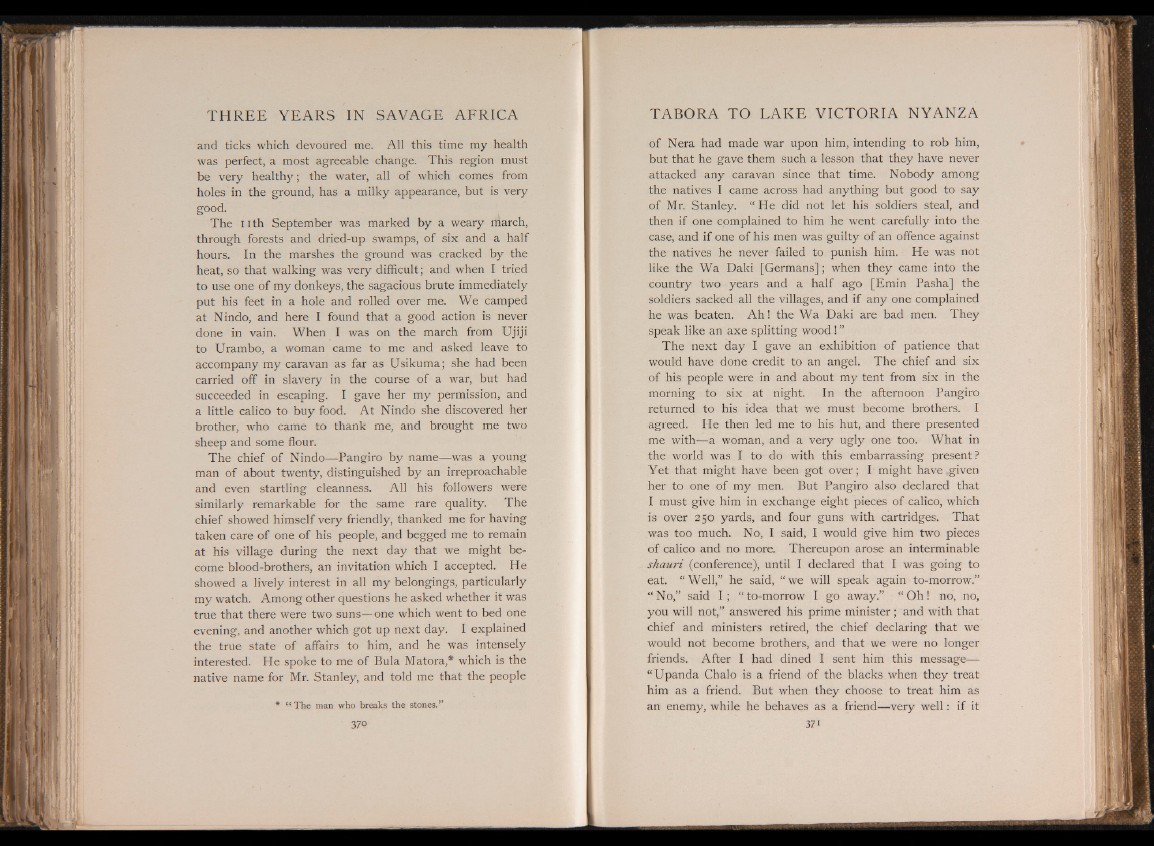
and ticks which devoured me. All this time my health
was perfect, a most agreeable change. This region must
be very healthy; the water, all of which comes from
holes in the ground, has a milky appearance, but is very
good.
The nth September was marked by a weary march,
through forests and dried-up swamps, of six and a half
hours. In the marshes the ground was cracked by the
heat, so that walking was very difficult; and when I tried
to use one of my donkeys, the sagacious brute immediately
put his feet in a hole and rolled over me. We camped
at Nindo, and here I found that a good action is never
done in vain. When I was on the march from Ujiji
to Urambo, a woman came to me and asked leave to
accompany my caravan as far as Usikuma; she had been
carried off in slavery in the course of a war, but had
succeeded in escaping. I gave her my permission, and
a little calico to buy food. At Nindo she discovered her
brother, who came to thank me, and brought me two
sheep and some flour.
The chief of Nindo—Pangiro by name—was a young
man of about twenty, distinguished by an irreproachable
and even startling cleanness. All his followers were
similarly remarkable for the same rare quality. The
chief showed himself very friendly, thanked me for having
taken care of one of his people, and begged me to remain
at his village during the next day that we might become
blood-brothers, an invitation which I accepted. He
showed a lively interest in all my belongings, particularly
my watch. Among other questions he asked whether it was
true that there were two suns—one which went to bed one
evening, and another which got up next day. I explained
the true state of affairs to him, and he was intensely
interested. He spoke to me of Bula Matora,* which is the
native name for Mr. Stanley, and told me that the people
* “ The man who breaks the stones.”
of Nera had made war upon him, intending to rob him,
but that he gave them such a lesson that they have never
attacked any caravan since that time. Nobody among
the natives I came across had anything but good to say
of Mr. Stanley. “ He did not let his soldiers steal, and
then if one complained to him he went carefully into the
case, and if one of his men was guilty of an offence against
the natives he never failed to punish him. He was not
like the Wa Daki [Germans]; when they came into the
country two years and a half ago [Emin Pasha] the
soldiers sacked all the villages, and if any one complained
he was beaten. Ah! the Wa Daki are bad men. They
speak like an axe splitting wood ! ”
The next day I gave an exhibition of patience that
would have done credit to an angel. The chief and six
of his people were in and about my tent from six in the
morning to six at night. In the afternoon Pangiro
returned to his idea that we must become brothers. I
agreed. He then led me to his hut, and there presented
me with—a woman, and a very ugly one too. What in
the world was I to do with this embarrassing present?
Yet that might have been got over; I might have,given
her to one of my men. But Pangiro also declared that
I must give him in exchange eight pieces of calico, which
is over 250 yards, and four guns with cartridges. That
was too much. No, I said, I would give him two pieces
of calico and no more. Thereupon arose an interminable
shauri (conference), until I declared that I was going to
eat. “ Well,” he said, “ we will speak again to-morrow.”
“ No,” said I ; “ to-morrow I go away.” “ Oh! no, no,
you will not,” answered his prime minister; and with that
chief and ministers retired, the chief declaring that we
would not become brothers, and that we were no longer
friends. After I had dined I sent him this message—
“Upanda Chalo is a friend of the blacks when they treat
him as a friend. But when they choose to treat him as
an enemy, while he behaves as a friend—very well: if it